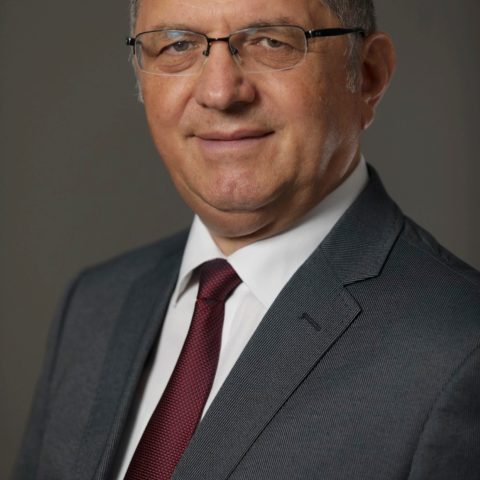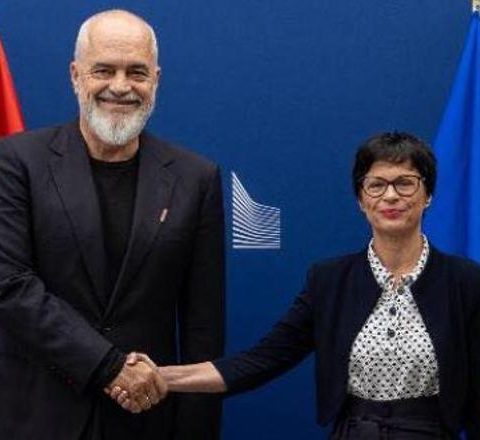TIRANA, Oct. 8, 2024 – In one of the most hard-line demonstrations in recent years, Albania’s opposition Democratic Party led a protest in Tirana on Monday night, calling for a caretaker transitional government and civil disobedience against the government.
The protest, which drew thousands of supporters, was set up in the form of a march that blocked traffic across the capital, with some protesters hurling Molotov cocktails at several state institutions and the headquarters of the ruling Socialist Party. Police responded with massive amounts of tear gas. Several police officers and demonstrators were hurt in the clashes, though none seriously.
Opposition leaders framed the demonstration as a direct challenge to what they described as the unchecked power of Prime Minister Edi Rama’s administration. The protest, organizers said, was the first step in a sustained effort to pressure the government into accepting their demands for political accountability.
Opposition leaders have long accused Prime Minister Rama of eroding democratic institutions, consolidating power and stifling political dissent. Moreover, the recent imprisonment of an opposition MP for a public accusation he made against a government minister as well as the continued house arrest of the DP leader, Sali Berisha, have fuelled opposition’s anger.
For months, opposition figures have been calling for a technical government — an interim administration that would oversee the organization of free and fair elections scheduled for next year. They argue that Rama’s government has manipulated electoral processes, controlled the judiciary, and undermined the rule of law, leaving Albania without functioning democratic checks and balances. This protest, they said, was a way to make those grievances heard.
“We are here because the government is no longer serving the people,” Flamur Noka, secretary general of the Democratic Party, told journalists during the protest. “Civil disobedience has started, and we will not stop until our demands are met.”
-Opposition ‘blocked’ from democratic processes-
While the immediate focus is on the opposition’s demand for a technical government, analysts suggest that the underlying causes of unrest go deeper. Journalist Andi Bushati, speaking in a television debate, argued that the opposition’s turn to civil disobedience is a direct result of the government’s refusal to engage with them in any meaningful way.
“This is not about Molotov cocktails — it’s about a government that has shut every door to democratic opposition,” Bushati said. “The opposition has been denied access to parliamentary processes, to investigations, to even basic dialogue with the government. What other option do they have but to take to the streets?”
Bushati highlighted several instances where opposition efforts to engage constructively were blocked, including attempts to hold government ministers accountable through parliamentary commissions or to challenge government policies through the Constitutional Court, which has remained paralyzed for years due to lack of appointments.
“The government has left the opposition no choice but to escalate,” Bushati added. “This is what happens when the democratic process itself is undermined.”
-Hoping to tap into wider frustrations-
Beyond the opposition’s direct demands, it hoped the protest would tap into broader public frustration with Albania’s political elite. Analysts note that while the protest was spearheaded by opposition leaders, many Albanians are disillusioned with the country’s stagnant political system, ongoing corruption and lack of economic opportunities.
“There is a sense that the political system is closed off and unresponsive to the needs of ordinary citizens,” said analyst Fatos Lubonja during a televised discussion. “People are fed up with seeing the same faces in power, and no real change happening.”
While the protest was violent in parts, with Molotov cocktails and vandalism, Lubonja argued that the opposition’s demands reflect a legitimate grievance: that the current government is not listening to the people. He emphasized that without meaningful reform, protests like Monday’s are likely to continue.
“The protest is justified,” Lubonja added. “These institutions are not working for the people. The opposition is saying this is the only way to get the government’s attention.”
-Government unmoved by protest-
Despite the opposition’s calls for a transitional government, there is little indication that Prime Minister Rama or his government is willing to consider such a move. In a statement following the protest, Interior Minister Ervin Hoxha condemned the violence and reaffirmed the government’s position that the police acted in accordance with the law to protect public order.
“The government will not be swayed by violence,” Hoxha said. “We are committed to upholding the law and protecting democratic institutions. Those who break the law will face justice.”
Rama’s government has repeatedly dismissed opposition demands for a technical government, pointing instead to ongoing reforms as evidence of its legitimacy.
However, opposition figures argue that these reforms are superficial and have not addressed the root problems of corruption, judicial dysfunction and electoral unfairness. They believe that without a transitional government to oversee free elections, Rama’s grip on power will remain unchallenged.










